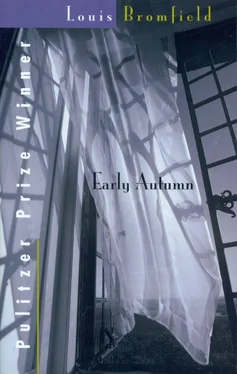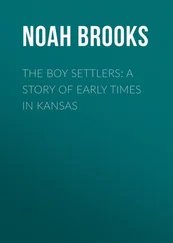“Yes. … It’s done.”
She saw that Higgins was mystified, and she was moved by a desire to tell him. Higgins ought to know certainly among the first. And she added, “It’s about Miss Sybil. She married young Mr. de Cyon this morning in Hartford.”
The news had a magical effect on the little groom; his ugly, shriveled face expanded into a broad grin and he slapped his thigh in his enthusiasm. “That’s grand, Ma’am. … I don’t mind telling you I was for it all along. She couldn’t have done better … nor him either.”
Again moved by impulse, she said, “So you think it’s a good thing?”
“It’s grand, Ma’am. He’s one in a million. He’s the only one I know who was good enough. I was afraid she was going to throw herself away on Mr. O’Hara. … But she ought to have a younger man.”
She turned away from him, pleased and relieved from the anxiety which had never really left her since the moment they drove off into the darkness. She kept thinking, “Higgins is always right about people. He has a second sight.” Somehow, of them all, she trusted him most as a judge.
John Pentland led her away, out of range of Higgins’ curiosity, along the hedge that bordered the gardens. The news seemed to affect him strangely, for he had turned pale, and for a long time he simply stood looking over the hedge in silence. At last he asked, “When did they do it?”
“Last night. … She went for a drive with him and they didn’t come back.”
“I hope we’ve been right,” he said. “I hope we haven’t connived at a foolish thing.”
“No. … I’m sure we haven’t.”
Something in the brilliance of the sunlight, in the certainty of Sybil’s escape and happiness, in the freshness of the air touched after the storm by the first faint feel of autumn, filled her with a sense of giddiness, so that she forgot her own troubles; she forgot, even, that this was her fortieth birthday.
“Did they go in Sabine’s motorcar?” he asked.
“Yes.”
Grinning suddenly, he said, “She thought perhaps that she was doing us a bad turn.”
“No, she knew that I approved. She did think of it first. She did propose it. …”
When he spoke again there was a faint hint of bitterness in his voice. “I’m sure she did. I only hope she’ll stop her mischief with this. In any case, she’s had a victory over Cassie … and that’s what she wanted, more than anything. …” He turned toward her sharply, with an air of anxiety. “I suppose he’ll take her away with him?”
“Yes. They’re going to Paris first and then to the Argentine.”
Suddenly he touched her shoulder with the odd, shy gesture of affection. “It’ll be hard for you, Olivia dear … without her.”
The sudden action brought a lump into her throat, and yet she did not want to be pitied. She hated pity, because it implied weakness on her part.
“Oh,” she said quickly, “they’ll come back from time to time. … I think that someday they may come back here to live.”
“Yes. … Pentlands will belong to them one day.”
And then for the first time she remembered that there was something which she had to tell him, something which had come to seem almost a confession. She must tell him now, especially since Jean would one day own all of Pentlands and all the fortune.
“There’s something I didn’t tell you before,” she began. “It’s something which I kept to myself because I wanted Sybil to have her happiness … in spite of everything.”
He interrupted her, saying, “I know what it is.”
“You couldn’t know what I mean.”
“Yes; the boy told me himself. I went to him to talk about Sybil because I wanted to make sure of him … and after a time he told me. It was an honorable thing for him to have done. He needn’t have told. Sabine would never have told us … never until it was too late.”
The speech left her feeling weak and disconcerted, for she had expected anger from him and disapproval. She had been fearful that he might treat her silence as a disloyalty to him, that it might in the end shatter the long, trusting relationship between them.
“The boy couldn’t help it,” he was saying. “It’s a thing one can’t properly explain. But he’s a nice boy … and Sybil was so set on him. I think she has a good, sensible head on her young shoulders.” Sighing and turning toward her again, he added, “I wouldn’t speak of it to the others … not even to Anson. They may never know, and if they don’t, what they don’t know won’t hurt them.”
The mystery of him, it seemed, grew deeper and deeper each time they talked thus, intimately, perhaps because there were in the old man depths which she had never believed possible. Perhaps, deep down beneath all the fierce reticence of his nature, there lay a humanity far greater than any she had ever encountered. She thought, “And I have always believed him hard and cold and disapproving.” She was beginning to fathom the great strength that lay in his fierce isolation, the strength of a man who had always been alone.
“And you, Olivia?” he asked presently. “Are you happy?”
“Yes. … At least, I’m happy this morning … on account of Sybil and Jean.
“That’s right,” he said with a gentle sadness. “That’s right. They’ve done what you and I were never able to do, Olivia. They’ll have what we’ve never had and never can have because it’s too late. And we’ve helped them to gain it. … That’s something. I merely wanted you to know that I understood.” And then, “We’d better go and tell the others. The devil will be to pay when they hear.”
She would have gone away then, but an odd thought occurred to her, a hope, feeble enough, but one which might give him a little pleasure. She was struck again by his way of speaking, as if he were very near to death or already dead. He had the air of a very old and weary man.
She said, “There’s one thing I’ve wanted to ask you for a long time.” She hesitated and then plunged. “It was about Savina Pentland. Did she ever have more than one child?”
He looked at her sharply out of the bright black eyes and asked, “Why do you want to know that?”
She tried to deceive him by shrugging her shoulders and saying casually, “I don’t know. … I’ve become interested lately, perhaps on account of Anson’s book.”
‘You … interested in the past, Olivia?”
“Yes.”
“Yes, she only had one child … and then she was drowned when he was only a year old. He was my grandfather.” Again he looked at her sharply. “Olivia, you must tell me the truth. Why did you ask me that question?”
Again she hesitated, saying, “I don’t know … it seemed to me. …”
“Did you find something? Did she,” he asked, making the gesture toward the north wing, “did she tell you anything?”
She understood then that he, marvelous old man, must even know about the letters. “Yes,” she said in a low voice, “I found something … in the attic.”
He sighed and looked away again, across the wet meadows. “So you know, too. … She found them first, and hid them away again. She wouldn’t give them to me because she hated me … from our wedding night. I’ve told you about that. And then she couldn’t remember where she’d hid them … poor thing. But she told me about them. At times she used to taunt me by saying that I wasn’t a Pentland at all. I think the thing made her mind darker than it was before. She had some terrible idea about the sin in my family for which she must atone. …”
“It’s true,” said Olivia softly. “There’s no doubt of it. It was written by Toby Cane himself … in his own handwriting. I’ve compared it with the letters Anson has of his.” After a moment she asked, “And you … you’ve known it always?”
Читать дальше












